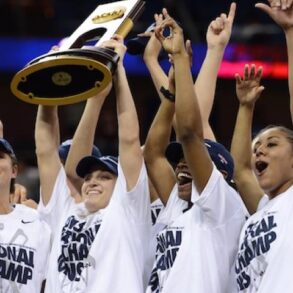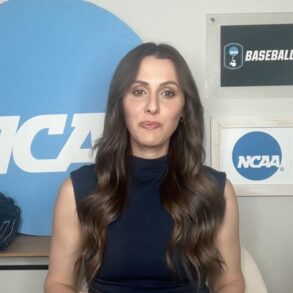- Vanderbilt quarterback Diego Pavia won a court ruling granting an extra year of eligibility, impacting athletes in other sports who spent time at junior colleges.
- The NCAA is appealing the ruling but issued a waiver allowing some seniors with junior college experience an extra year, creating uncertainty for other players.
- Coaches face uncertainty with potential roster limits, conference realignment, and changing rules around NIL and the transfer portal.
- Junior college could become a more attractive option for some, offering potential extra eligibility and free education, but top prospects may still opt for Division I.
- The uncertainty surrounding eligibility rules, roster limits, and scholarships has left coaches and recruits in limbo, unsure of the best path forward.
Two weeks before the start of the Division I baseball season, first baseman Alberto Osuna made shockwaves in the baseball world when he left the University of Tampa, an NCAA Division II school, on opening day and transferred to Tennessee, joining the Vols for the 2025 season.
Osuna, a former North Carolina slugger, was at Tampa because of an NCAA rule that granted players who had spent the 2021 season at a junior college an extra year of eligibility — but not at the Division I level. Osuna, and others in his situation, suddenly had new life due to a player for a rival school in a different sport.
In December, Vanderbilt quarterback Diego Pavia received a court ruling granting him an extra year of eligibility due to a judge stating that the NCAA’s rules counting junior college eligibility against Division I eligibility violated antitrust law. The NCAA is appealing the decision, but in the meantime, it issued a waiver allowing some players who would be in their last year of eligibility and had spent time at a junior college to play an extra year.
While a handful of football and basketball players have taken advantage of the rule, it’s especially impacted baseball, where junior college recruiting is especially prominent. Osuna isn’t the only beneficiary in the SEC: Georgia outfielder Dylan Goldstein has also rejoined the program hoping he, too, can take advantage of the waiver after originally running out of eligibility.
SEC TEAMS TO KNOWSEC baseball preview: Top teams, players, transfers to know in 2025 led by Texas A&M
Need a break? Play the USA TODAY Daily Crossword Puzzle.
How Diego Pavia’s ruling led to uncertainty in college baseball
Right now, Pavia’s court ruling applies only to him and the NCAA’s waiver applies only to seniors that are in their final year of eligibility. For juniors and sophomores with junior college experience, and players currently at the juco level, there’s no guarantee their eligibility will be extended.
Although Pavia’s ruling hinged in part on the fact that the judge saw a “high likelihood” of success for the case, the NCAA has chosen to fight this one instead of settling like it has with several other cases. A changeover in the government administration could also lead to people in positions of power who are more friendly to the NCAA’s positions.
Junior college eligibility is just one issue of a growing list where coaches are dealing with uncertainty. Part of the House settlement, which would implement revenue-sharing in college sports, would institute roster limits across all sports, including reducing the roster size for college baseball from 40 to 34. The threat of roster limits has led to some committed 2025 recruits being dropped by their schools. At the same time, the settlement has yet to be finalized, as are the exact rules of the roster limits.
Even with juco players possibly having extra eligibility, they are a group that risks getting squeezed out by the new rules. With fewer roster spots, coaches will likely focus on top-ranked high school recruits and transfers who have already proven themselves at the DI level.
Jim McGuire, the baseball coach at Volunteer State Community College in Hendersonville, said that it’s become harder to get his players placed at Division I schools and that many who would have previously gone DI are now heading to DII, DIII or NAIA schools.
“It becomes tougher for both the high school player coming out and then the junior college player trying to move on,” McGuire told The Tennessean.
There are differing opinions in the industry about the merits of Pavia’s case, but the primary gripe from many coaches is that it adds yet another uncertainty to their plates. With roster limits, conference realignment, the House settlement and ever-changing rules around NIL and the transfer portal, many coaches have struggled to plan ahead in recruiting, not knowing what the rules will be in the near future.
“I’d sign that on for (Pavia) to be able to come back real quick as everybody else would,” Vanderbilt hitting coach Jayson King told The Tennessean in November. “ … It hasn’t happened this way, unfortunately, but I think any changes that are of big size … need to be planned ahead of time.”
Why junior college could become more attractive baseball option
Most people agree that if Pavia’s ruling becomes permanent, the juco route will become more attractive to high school players, though it’s not yet known to what extent. While extra DI eligibility would make juco more attractive, the DI route, especially in the SEC and ACC, has also come with additional perks. NIL gives players the chance to make money before getting drafted, and some schools give baseball players NIL deals even if they don’t see meaningful playing time. Along with the roster limits comes the potential that some teams could offer all rostered players full scholarships.
The majority of juco players won’t earn money from NIL. Top-level schools tend to have better facilities and, of course, the opportunity to play in the College World Series. But junior colleges have also taken note of the new environment, and in many states community college is free for certain people. In Tennessee, for instance, the TN Promise program allows Tennessee high school graduates the opportunity to attend community college for free as long as they maintain a 2.0 GPA and complete community service requirements. For a player who would be on the fringe of making a roster at the DI level, if Pavia’s ruling is made permanent such a program could lead to as many as six years of free education.
“If you’re a junior college and you do it right, have good facilities and you recruit, you have a strength program, I think those guys are coming in, 20, 21 years old and that’s what Division Is are looking for because those guys have to win now,” said former Cookeville High baseball coach Butch Chaffin, who played at the juco level and also worked as a scout, a DI assistant coach and a coach with USA Baseball.
At the top level of college baseball, the impacts of the ruling may not be felt immediately. While some juco transfers make an impact on the SEC, the number is fairly limited. And players who have a chance to play right away at an SEC school are unlikely to choose the junior college route even if they have more eligibility.
More:Vanderbilt says fans can storm court. They just have to wait a full minute to avoid fines
What could become more common, though, is players starting at a junior college, transferring to a mid-major school for two years, then grad transferring to an SEC or ACC school where their experience and more-developed physicality will be assets. This is the route Pavia himself took.
Another potential impact is top schools using junior colleges as “feeder schools” of sorts. In this instance, teams could take incoming freshmen not likely to make the roster and tell them to go play at a junior college, with the potential of coming back and earning a roster spot at that same school after 1-2 years of experience and still four years of eligibility.
“Now you’re almost saying, hey, go develop a couple years at a junior college, and then we’ll take a look at you, because now you’ll be well seasoned to come in and contribute right away,” said Tad Slowik, a former Astros scouting director and junior college coach who now does juco team and player rankings for his organization, Dream Big Athletics.
If the extra eligibility for juco players becomes permanent, Mike Rooney, an analyst for D1Baseball who was formerly an assistant coach at Arizona State and the coach of Phoenix College, suggested that players trying to transfer up from the low-major level could end up the ones squeezed out of roster spots, as they would be both unproven at the highest level and have less eligibility than high school or juco players.
With so much uncertainty still looming about both the future of juco eligibility rules, as well as roster limits, revenue sharing and scholarships, many coaches and recruits have been caught in limbo. Current players on Division I rosters who are not seniors aren’t sure when their eligibility will end. Even once players get on campus, the sudden eligibility of players like Osuna at Tennessee and Goldstein at Georgia will result in players who thought they had a roster spot finding that is no longer the case.
Walters State Community College coach David Shelton has experience coaching both at the Division I level at ETSU and in juco. But even he isn’t sure how he would advise his eighth-grade son.
“I feel bad for parents,” Shelton said. “I’m a college baseball coach and I’m sitting here not even 100% sure what’s the best way to advise my own son.
“ … I spent a lot of time talking to four-year schools and talking to their coaches and they’re just as up in the air about things as I am, like what’s going to happen? Where is it going to lead? What are the rules going to be six months from now?”
Aria Gerson covers Vanderbilt athletics for The Tennessean. Contact her at agerson@gannett.com or on X, formerly Twitter, @aria_gerson.
This post was originally published on this site be sure to check out more of their content.










